Orbán's dream has come true, only not in Hungary
We travelled to Malta, the frontline of the migrant-wave, to face two surprising facts.
- The Mediterranean island is, indeed, the Hungarian governing party's, the Fidesz's ideal state.
- Migrants have disappeared from the country without the world knowing anything about it. Is there a connection between the two? Malta even mislead the BBC. But it could not mislead us.
Malta is a tiny island at the very centre of the migration route across the Mediterranean Sea, near Lampedusa. An interesting feature to it is that while migrants flood Lampedusa, the situation in Malta is as quiet as if it was still the 1990s, when migration was not Europe's major concern.
But the country can embody the dream of the Orbán government for several other reasons too.
- Migrants are not treated with kid gloves on the island. The new arrivals are immediately put in an enclosed camp. They have to stay there for three or four, earlier even as long as eight months, in hard, prison circumstances.
- Less than fifty people are acknowledged officially as refugees, despite that most of them are publicly known to have come from countries at war.
- Instead of a refugee status, their majority receive a temporary state to be renewed yearly, entailing limited rights and total defencelessness.
- Owing to the government's anti-immigrant propaganda, racism is strong among the inhabitants. (The official rhetoric has been milder in the last six months, but since that time hardly any more migrants have arrived in the country.)
That is to say, all what Orbán's government is striving for has been implemented in Malta. And it happened in the way that, while in the world's eyes Malta is one of the symbols of the immigration crisis, migrants have not arrived in Malta for years. And nobody talks about that. In a recent article for example, the BBC publishes a long discussion of what effects the migrants' tragedies at sea make on Malta, not mentioning that the problem yielded by the refugees is a thing of the past.
Where are the migrants?
I went to Malta from the southern Italian Lampedusa island, where I met hundreds of freshly rescued migrants every day. Compared to this it was shocking when, less than 160 kilometres to the east, Neil Falzon, director of Aditus, an NGO protecting human rights, started our conversation with this:
Migrants stopped coming to Malta a year and a half ago. Only 91 migrants have come to us in 2015.
As it turns out, there is no paranormal phenomenon behind the scene, which hides Malta from ship radars. Until 2013, the country experienced the same pressure as the nearby Italy. Only in 2013, two thousand migrants arrived in Malta on ship, and in the previous year this number was also above 1800. For the interpretation of the data it is important to take into consideration that the population of the island is only four hundred thousand, and its expanse is somewhat smaller than that of Budapest.
However, amid the spate of migrants the attitude of Malta was characterised by hysteria and small-mindedness: the government demanded help from the EU, while it began a wrangle with Italy about which country should take in the people rescued from the sea. We also wrote about one of the cases where a rescue ship full of migrants had to idle at sea until an 18-year-old, pregnant girl died.
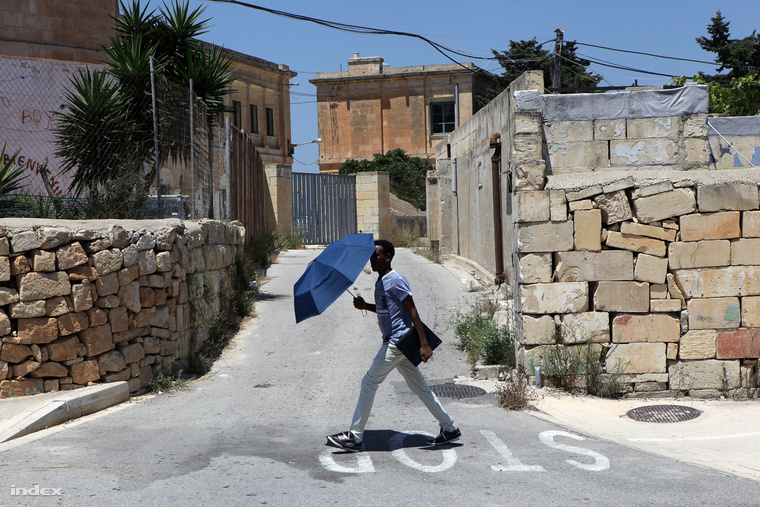
This is the way Neil Falzon concluded the story: “Mare Nostrum, the Italian naval rescue operation began, then Triton, financed by the EU, and no more migrants were transported to Malta. Everybody was received by Italy.”
“The enclosed camps are now empty. There are eight people altogether in the camp that was earlier criticised by the EU for being overcrowded,” – confirmed the surprising information a member of JRS, a Jesuit refugee service organisation.
Neil Falzon, the director of the foundation for the protection of human rights gave us further details of the strange situation: “Rescue ships don't bring here the people they have rescued, but take them to Italy. This year's 91 refugees must have managed to come here by not meeting a rescue ship on their way, so they accidentally got as far as Malta.”
A secret pact
But what international agreement allows Malta to completely stay out of the vexation, when the EU officially propagates the solidarity of the member states?
Falzon added further unexpected details to the picture: “There is no official agreement whatsoever. There must be a deal in the background. The experts concluded that it must be the case when it became clear that the number of immigrants was drastically decreasing.” According to the lawyer, the government intentionally avoids the topic. “They are trying to pretend that nothing happened. Maybe they hope that if they don't talk about it, nobody will notice that refugees don't come to us any more.”
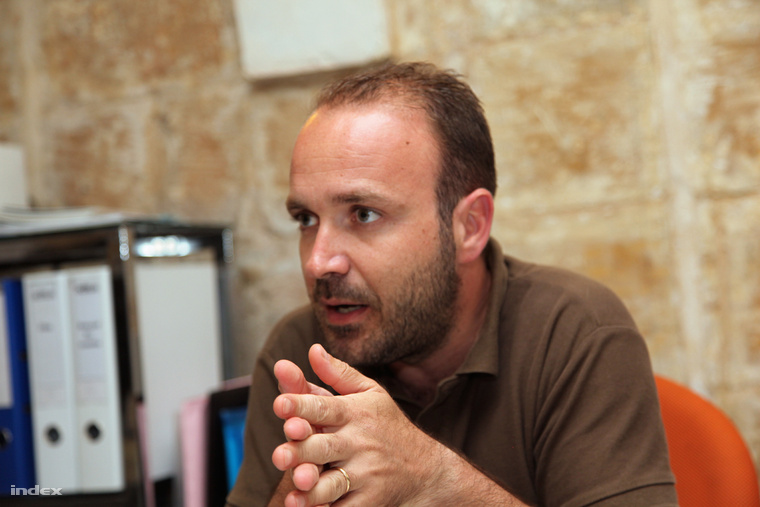
“A journalist asked the prime minister about what was behind the change in the migrant situation. The answer was that the Italians understand Malta's difficulties, that is why they admit all the rescued people. About Malta's role he said we would help in some other way. But nobody knows what this help means, and how long the secret pact lasts.”
The latter was related by monk Mark Cachia, a member of the Jesuits, in a puritan office set up in a school.
A prison for the innocent
What needs to be known about the Jesuit organisation called JRS is that they do not offer support for the government's acts against migrants, but do humanitarian work. Apart from the above mentioned Aditus, they also work on the humanisation of the country's grim regulations. They take part in the healthcare of the people living in enclosed camps, they offer psychological and legal help, and support the immigrants' employment.
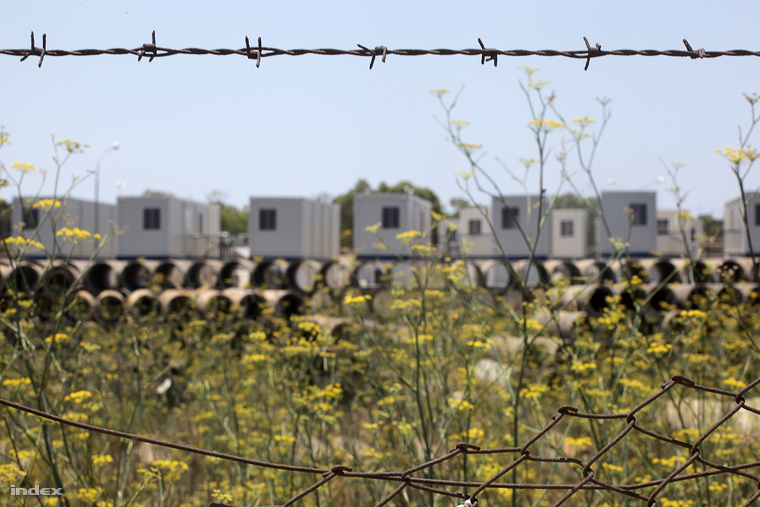
And they have work to do even in the present situation:
- The several thousands of migrants who arrived before 2013 have been held captive by the island, but not like tourists who have fallen in love with the romantic sunsets, but rather like people who walked into a tricky trap.
- Malta implemented years ago what the Hungarian government is only pushing in statements as yet: instead of the hassle with human rights, fiddling with individual complaints, every immigrant is handled like a criminal, and gets put in refugee detention on arrival. The term “refugee detention” soon turns out to be a euphemism.
“It is called refugee detention, but it was simply a prison.”
– told me the twenty-year-old Mohamed in the refugee camp outside Hal Far. The Somalian boy was 17 when he got to Malta, but with a fake passport he managed to get as far as Sweden. “Sweden was very good. While I was waiting for judgment over my application for asylum I could study, and I lived at a decent place. Then due to Dublin (that is how the Dublin Regulation is mentioned by frowning refugees) I was sent back to Malta; then I was 18 already, so they put me in detention. I was there for two months. They treated me like a criminal,” – shook his head the boy, who has been living in a container in an open camp, far away from inhabited areas, for two years.
Enclosed camps, however, differ from prison in some respects. Because, while in prison it is known how long the custody will last, the migrants are kept behind bars for an unforeseeable time. Before the forceful intervention of the EU it was accepted that one who applies for asylum is kept behind bars until the decision on their application. Since the formulation of the statutes is vague, innocent people could be held in prison conditions for years on end. Thus, it was those who were forced to endure the most who had, by then, suffered the circumstances in their home countries, that is why they had applied for asylum.
The employee of the Jesuite JRS did not see much difference between prison and refugee detention either:
“If the migrant kept in detention needs to visit the doctor, they are handcuffed and taken to hospital chained, escorted by two soldiers.”
“These things only increase the nervousness of the Maltese, since how do they meet the migrants? Handcuffed, and watched over by guards. No wonder that migration is associated with crime,” – pointed out the long-term consequences of the negative practice monk Mark Cachia.
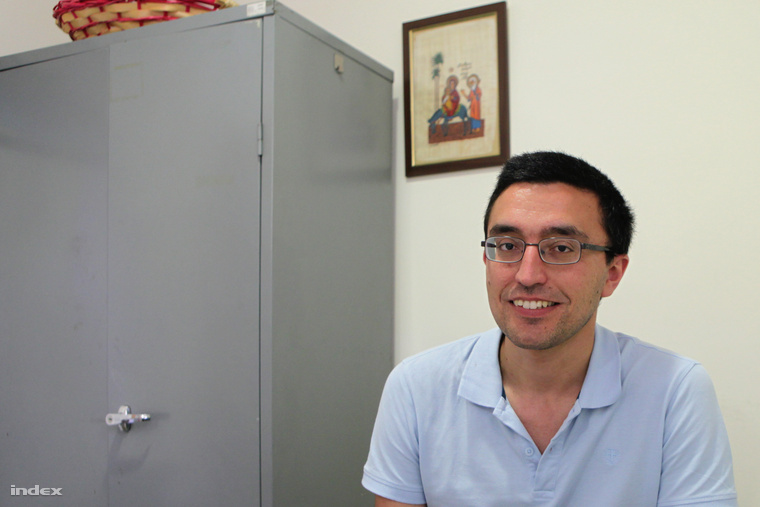
“Malta lies at the central Mediterranean route. This is not the route economic immigrants use” – Neil Falzon underpinned the inhumanity of the practice. According to the lawyer's data, half of the migrants living in Malta are from Somalia, the rest is from Syria, Eritrea and Libya. All of them such countries that remind one, who has managed to open a newspaper in the recent years, of chaos and war.”
In fact, the Maltese government openly forced the miserable people into despicable conditions with the intent to deter them. “It is good, when the applicants for asylum call their relatives to tell them that Malta is a horrible place, and warn them not to come here,” – stated, forerunning the logic of the Hungarian government, Tonio Borg, Maltese minister of foreign affairs in 2009.
“This approach is obviously not only inhuman but pointless as well. Migrants keep coming regardless, nobody is scared off by this practice. That the EU rescue ships take them to Italy now is another question,” – summarised his government's strategy Neil Falzon.
The tragedy of the Rózsi Demjén look-alike
I found an example of how the detention of the asylum seekers is a blend of inhumanity and senselessness, at the counter of an immigrants' pub. The story of Abdul, who runs the pub, was so powerful that after some sentences I even forgot that the Ethiopian man was the most perfect look-alike of Rózsi Demjén on the northern hemisphere.
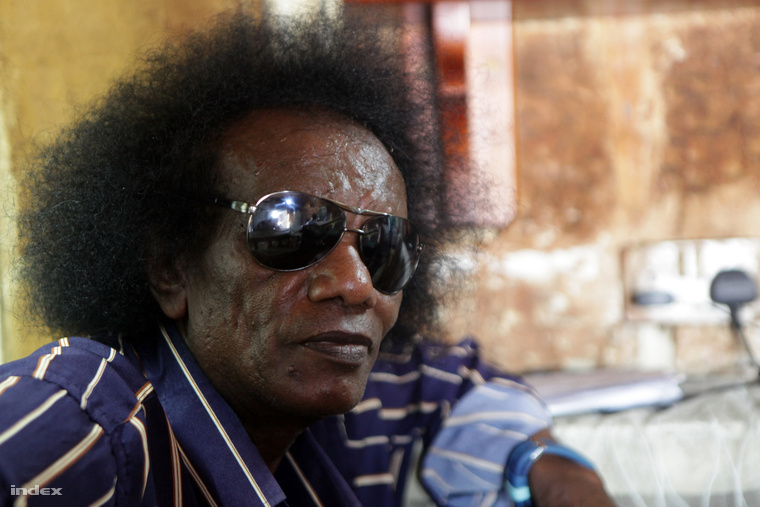
“I've been living in Malta for twenty-five years; in the first five years my stay was legal, I had a visa. I worked, I rented a house, I had savings,” – he told me, while he was trying to turn down the bellowing Ethiopian pop. (Which is, by the way, one of the best trends of pop, but that is beside the point.) He gave up eventually, and yelled the story about how the tightening of immigration policies cut the ground from under his feet.
The man, who has been living in Malta for years, was made by law an immigrant overnight when the anti-immigrant hysteria began. He was locked up in an enclosed camp for a year, then, for reasons not elaborated but presumable, ended up in the psychiatric ward, where he spent three months. Returning to his life, he found his house robbed, his money had run out, and he had to move into one of the open refugee camps. He has lived there and run the New Tiger Pub ever since.
That is the pub which will be the main venue of the second part of this article.
In the next chapter we shall encounter a car-chase, then, at the far end of the dilapidated port, we will submerge in a four-level refugee mall that would fit into an old style French Legion novel. We do this for the sake of seeing what life is like when Malta entraps you.
Read our other stories on the migration crisis
Our journalist crossed the border between Serbia and Hungary illegally, with a group of Afghani migrants. Read the first part. and the 2nd part of our series.
The dream island, Lampedusa where people could hate immigrants. But why don't they?
The world of Mad Max does exist: slavery, desert, and war on the route from Africa to Italy
This happened later, when hundreds of migrants appeared on the main Hungarian railway station. They couldn't travel further, so they camp in the middle of the city for weeks.

Support the independent media!
The English section of Index is financed from donations.


